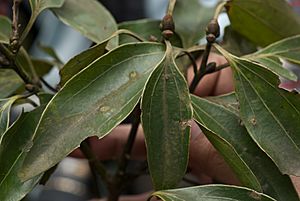Pseudocinnamomum facts for kids
Quick facts for kids Pseudocinnamomum |
|
|---|---|
 |
|
| Conservation status | |
| Scientific classification |
|
| Kingdom: | Plantae |
| Clade: | Tracheophytes |
| Clade: | Angiosperms |
| Clade: | Magnoliids |
| Order: | Laurales |
| Family: | Lauraceae |
| Genus: | Cinnamomum |
| Species: |
C. osmophloeum
|
| Binomial name | |
| Cinnamomum osmophloeum Kaneh.
|
|
| Script error: The function "autoWithCaption" does not exist. | |
Script error: No such module "Check for conflicting parameters".
Cinnamomum osmophloeum, also known as pseudocinnamomum or indigenous cinnamon, is a medium-sized evergreen tree. It belongs to the Cinnamomum family. This tree grows naturally in the broad-leaved forests of central and northern Taiwan.
A special oil called Cinnamaldehyde comes from C. osmophloeum. This oil is used in many products. It can also help stop something called xanthine oxidase, which means it might be useful for treating conditions like hyperuricemia and gout.
Traditional Uses
For a long time, people have used Cinnamomum osmophloeum in traditional ways. It has been used to help with several health issues:
- Easing tummy troubles like diarrhea from cold drinks
- Helping with indigestion
- Relieving colds
- Improving blood circulation
- Helping with irregular periods
- Boosting energy and focus
This plant is also a main ingredient in a traditional drink called Wu jia pi wine. You can also use it to make a type of cinnamon tea. The Tsou people, who are one of the aboriginal groups in Taiwan, call Cinnamomum osmophloeum by the name Nigi.
Modern Uses
Cinnamomum osmophloeum is now seen as a great replacement for regular cinnamon. The main parts of its essential oil are cinnamaldehyde and coumarin.
This tree is even better than regular cinnamon in some ways. You can get essential oils not just from its bark, but also from its branches and leaves. The amount of essential oil you can get from the leaves and branches is five times more than from the bark. This is great because it means there is no need to cut down the trees or strip their bark. Instead, people can just collect the leaves. This makes it a very sustainable product that can be harvested year after year. It has the potential to be an excellent non-wood forest product.
 | Bessie Coleman |
 | Spann Watson |
 | Jill E. Brown |
 | Sherman W. White |


